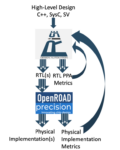Quantum algorithms must be simulated on classical computers to validate correct behavior, but this looks very different from classical logic simulation. Paul Cunningham (GM, Verification at Cadence), Raúl Camposano (Silicon Catalyst, entrepreneur, former Synopsys CTO and lecturer at Stanford, EE292A) and I continue our… Read More
Tag: bernard murphy
Quantum Advantage is About the Algorithm, not the Computer
Of course there is a minimum requirement for the computer: enough qubits, fault-tolerant computing, support for hundreds of millions or more computations before a reset, that sort of thing. We’re still on that journey but even after we reach this goal it is important to have a sense of what delivers advantage since the computer … Read More
Quantum Computing Technologies and Challenges
There’s more than one way to build a quantum computer (QC) though it took me a while to find a good reference. I finally settled on Building Quantum Computers: A Practical Introduction. Excellent book but designed only for those who will enjoy lots of quantum math. I’m going to spare you that and instead describe a couple of the more… Read More
Reimagining Architectural Exploration in the Age of AI
This is not about architecting a full SoC from scratch. You already have a competitive platform, now you want to add some kind of accelerator, maybe video, audio, ML, and need to explore architectural options for how accelerator and software should be partitioned, and to optimize PPA. Now we have AI to help us optimize you’d like … Read More
Quantum Computing Algorithms and Applications
In an upcoming Innovation blog we’ll get into how quantum computers are programmed. Here I’d like to look more closely at algorithms beyond Grover and Shor, and what practical applications there might be for quantum computing. I also take a quick look at what analysts are saying about potential market size. Even more than in AI, … Read More
AI Deployment Trends Outside Electronic Design
In a field as white-hot as AI it can be difficult to separate cheerleading from reality. I am as enthusiastic as others about the potential but not the “AI everywhere in everything” message that some emphasize. So it was interesting to find a survey which looks at the deployment reality outside our narrow domain of electronic and … Read More
Propelling DFT to New Levels of Coverage
Siemens recently released a white paper on a methodology to enhance test coverage for designs with tight DPPM requirements. I confess when I first skimmed the paper, I thought this was another spin on fault simulation for ASIL A-D qualification, but I was corrected and now agree that while there are some conceptual similarities… Read More
An Assistant to Ease Your Transition to PSS
At times it has seemed like any development in EDA had to build a GenAI app that would catch the attention of Wall Street. Now I see more attention to GenAI being used for less glamorous but eminently more practical advances. This recent white paper from Siemens on how to help verification engineers get up to speed faster with PSS is … Read More
We Need to Turn Specs into Oracles for Agentic Verification
The natural language understanding now possible in LLMs has raised interest in using specs as a direct reference for test generation, to eliminate need for intermediate and fallible human translation. Sadly, specs today are not an infallible source of truth for multiple reasons. I am grateful to Shelly Henry (CEO of MooresLab)… Read More
Website Developers May Have Most to Fear From AI
Further on the theme of what jobs will AI displace or radically change, I have been thinking about Walmart’s recent announcement with OpenAI, to enable customers to buy products directly within ChatGPT. Seems far removed from any care-abouts in electronic design but bear with me. We’ve been hearing about sizeable layoffs at Amazon,… Read More










